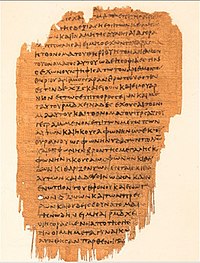Revelation 17
Chapter of the New Testament From Wikipedia, the free encyclopedia
Chapter of the New Testament From Wikipedia, the free encyclopedia
Revelation 17 is the seventeenth chapter of the Book of Revelation or the Apocalypse to John in the New Testament of the Christian Bible. The book is traditionally attributed to John the Apostle,[1][2] but the identity of the author remains a point of academic debate.[3] This chapter describes the judgment of the Whore of Babylon ("Babylon the Harlot").[4]
| Revelation 17 | |
|---|---|
 Revelation 13:16-14:4 on Papyrus 47 from the third century. | |
| Book | Book of Revelation |
| Category | Apocalypse |
| Christian Bible part | New Testament |
| Order in the Christian part | 27 |
The original text was written in Koine Greek. This chapter is divided into 18 verses.
Some early manuscripts containing the text of this chapter are among others:[5][lower-alpha 1]
After being mentioned only briefly in Revelation 14:8 and 16:19, Babylon is given a full description in this section.[8]
The words "to me" do not appear in Codex Alexandrinus or in the Vulgate translation.[11]
Lutheran Pietist theologian Johann Bengel notes a parallel with Tyre, which "committed fornication with the kingdoms of the earth" in Isaiah 23:17–18.[13]

The King James Version, New King James Version, and Young's Literal Translation (1862) include the word 'mystery' (or 'secret' - YLT) within her title, but in many other English translations the word is descriptive of the name: "a name of mystery" (Revised Standard Version, English Standard Version), "a name that has a secret meaning" (Good News Bible).[15]
This verse contains two descriptions of Christians which seem to refer to the same group (not two groups) of people.[8]
In response to John's astonishment at the vision of the harlot, an interpretation is given as much about the beast as about the harlot, because 'her fate is closely related to the career of the beast'.[8]
Whereas one of Revelation's key designations for God is the term 'the one who was and who is and who is to come' (1:4, 8), in this verse the beast is twice described in a similar term, but with the significant different in the middle which is negative: 'is not', because unlike God, the beast is not eternal and his second coming "will prove a fraud" and "go to destruction".[8]
Seamless Wikipedia browsing. On steroids.
Every time you click a link to Wikipedia, Wiktionary or Wikiquote in your browser's search results, it will show the modern Wikiwand interface.
Wikiwand extension is a five stars, simple, with minimum permission required to keep your browsing private, safe and transparent.